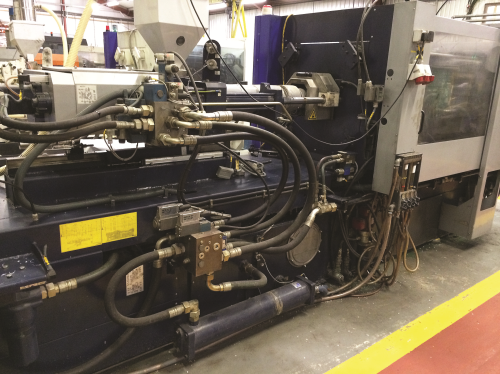
The digital edition of the magazine is distributed free of charge to readers who meet our qualifying criteria. You can apply to receive your free copy by completing this short registration form.
Atlantic Plastics of Bridgend, South Wales, part of the Talis Group, makes fittings for water utilities and the distribution market, including boundary boxes for domestic properties. All injection moulding for the company’s products are done on site using 36 machines. The company wanted to cut energy costs for its production as well as improve its environmental credentials.
Gary James, Engineering Manager for the plant says: “We are trying to become greener and cut energy use and had identified our two 400 ton injection moulding machines as energy intensive.” James approached ABB authorised value provider APDS for a solution. “APDS recommended an ABB variable-speed drive which had the reliability and robustness we needed. We talked to other suppliers as well but APDS gave us the confidence that their hardware and service solutions were the right ones for us.”
Low purchase cost
To arrive at the best solution, APDS investigated the injection moulding machines, which rely on hydraulic pumps to generate energy to move their mechanical parts. The hydraulic pump is powered from an electric induction motor, chosen for low purchase cost, efficiency, ruggedness and low maintenance. This motor ran at a fixed speed, but for most of the cycle time the machine operations did not need all the oil delivered by the pump. Any excess oil volume was returned back to the oil reservoir, wasting the energy used to pump it.
An investigation showed that the existing direct-on-line installation used 25.3 kW. APDS installed a trial drive at the site to measure the actual demand required and match the flow to this demand. This drive drew 10.5 kW, giving an average hourly saving of £1.28 in electricity costs. These readings were confirmed by Atlantic Plastic using their own power meter.
Alan Jones of APDS says: “The flow was gradually reduced on the ‘on load’ and ‘off load’ parts of the cycle. The drive was set up to run at two separate speeds which were selected automatically by the drive monitoring the torque demand on the motor. When this dropped off, indicating the end of the pressurising cycle, we reduced the speed of the motor to 42 Hz using the relay built into the drive. An alternative method would have been to use a pressure transducer to measure the oil pressure and control the motor speed accordingly but this would have entailed some fairly major alterations to the hydraulics of the machine. Using the abilities of the ABB drive meant we avoided the time and expense that this would entail.”
Unaffected by reduction
The cycle time of the moulding machine, which is 113 seconds, was unaffected by the reduction in the flow rate on the ‘on load’ and ‘off load’ parts of the cycle. The IP21 drive is supplied in a floor mounted steel enclosure. Because it is on the shop floor, the enclosure provides extra protection for the drive from collision with vehicles and the moving parts of other machinery.
Adds James: “The payback was about 12 months. For any investment we make we look for a payback of under two years, so we are very pleased with the results of the project. We intend to put similar solutions on the remaining 35 injection moulding machines.”
The digital edition of the magazine is distributed free of charge to readers who meet our qualifying criteria. You can apply to receive your free copy by completing this short registration form.




